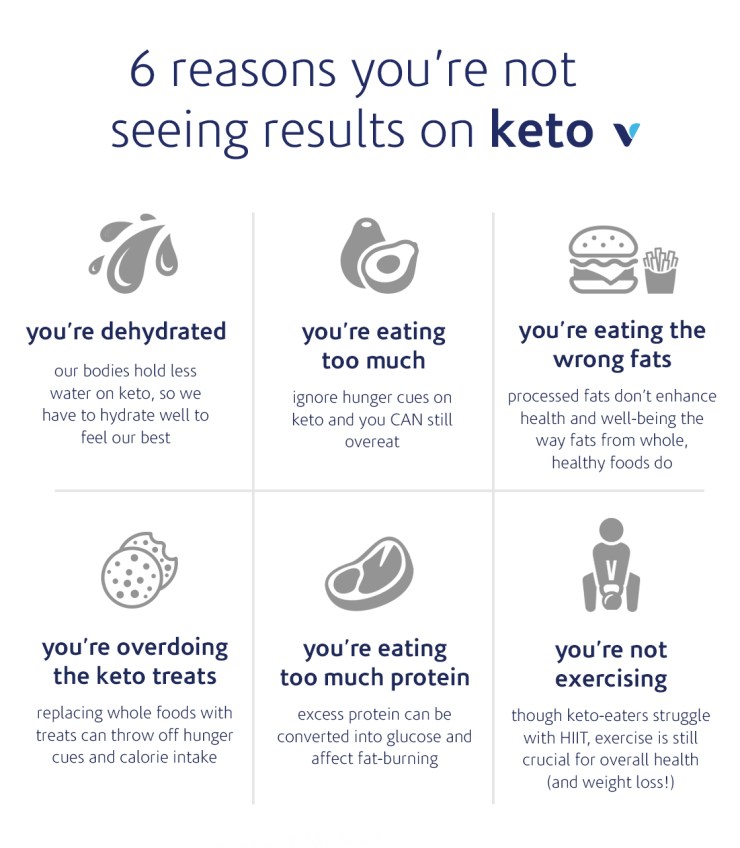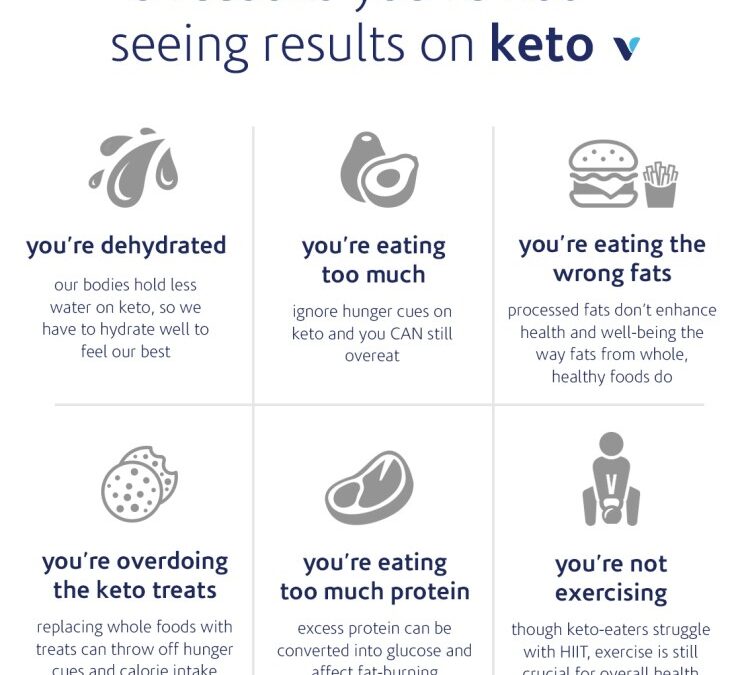Are you frustrated with your keto diet not producing the results you were hoping for? Don’t worry, you’re not alone. Many people embark on the keto diet with high hopes of losing weight and improving their health, only to be disappointed when they don’t see the desired results. But fear not, there may be a solution to your problem. In this article, we’ll dive into the reasons why your keto diet might not be working and how a custom keto diet plan could be the answer you’ve been looking for.
So, you’ve been faithfully following your keto diet, cutting out carbs and enjoying all the delicious high-fat foods. But somehow, the scale hasn’t budged and your energy levels haven’t skyrocketed like you were expecting. What gives? Well, there are a few common mistakes that people make when trying to follow the keto diet, which can prevent them from seeing the results they want. From not tracking their macros accurately to consuming hidden carbs, these small missteps can make a big impact on your progress. But don’t worry, in the next article, we’ll go over these mistakes in more detail and offer tips on how to overcome them. So stay tuned and get ready to kickstart your keto journey!

Possible reasons why your keto diet isn’t producing results
If you’ve been following a keto diet but haven’t seen the desired results, there could be several reasons for this lack of progress. The keto diet is a low-carb, high-fat diet that aims to put your body into a metabolic state called ketosis, where it burns fat for fuel instead of carbohydrates. However, there are several factors that may be hindering your progress. In this article, we will explore some possible reasons why your keto diet isn’t producing results and provide practical solutions to address these issues.
Inaccurate macronutrient tracking
One common mistake that people make on the keto diet is inaccurate macronutrient tracking. Keeping track of your macros (carbohydrates, fats, and proteins) is crucial to ensure that you are in the right balance to achieve ketosis. If you are not accurately tracking your macros, it can be challenging to know if you are actually reaching your desired macronutrient ratios.
To overcome this issue, it is essential to understand the importance of tracking macros and invest in reliable tracking tools and apps. These tools can help you measure food accurately, consider portion sizes, and ultimately re-evaluate your macro goals. If you find it challenging to track your macros on your own, consider seeking professional guidance from a nutritionist or dietitian who can help you create a customized plan.
Consuming too many hidden carbs
Even if you think you’re following a strict keto diet, you may still be consuming hidden sources of carbohydrates unknowingly. Hidden carbs can be found in various foods, such as processed snacks, sauces, and condiments. These hidden carbs can quickly add up and prevent you from achieving ketosis.
To tackle this issue, it’s crucial to become more mindful of the foods you consume. Read food labels and ingredient lists carefully to identify hidden sources of carbohydrates. Be particularly cautious with condiments and sauces, as they often contain added sugars and starches. Opt for low-carb alternatives whenever possible and consider meal planning and preparation to control your carb intake effectively. Additionally, tracking net carbs instead of total carbs can help you stay on track and ensure you’re not consuming too many hidden carbs.
Insufficient fat intake
The keto diet relies heavily on consuming high amounts of healthy fats to achieve and maintain ketosis. However, if you’re not consuming enough fat, it can hinder your progress. Fat is not only a crucial energy source on the keto diet, but it also helps keep you feeling satiated and prevents overeating.
To address this issue, make sure you understand the role of fat in a keto diet and incorporate healthy fats into your meals. Choose high-quality sources of fat such as avocados, nuts, seeds, and olive oil. Additionally, consider adding oils and nuts to your diet to increase your fat intake. Experiment with new keto-friendly recipes that incorporate healthy fats to make your meals enjoyable. If you’re unsure about your fat intake, consulting with a nutritionist can provide valuable guidance and ensure you’re meeting your goals.
Inadequate protein consumption
While the keto diet is primarily focused on limiting carbohydrates and increasing fat intake, it’s essential not to overlook the importance of protein. Consuming an inadequate amount of protein can hinder your progress on the keto diet and have negative effects on your overall health.
Protein plays a crucial role in ketosis by supporting muscle growth, repair, and maintenance. It also helps to keep you feeling full and satisfied. To ensure you’re getting enough protein, calculate your protein needs based on your activity level and body composition goals. Include protein-rich foods such as meat, poultry, fish, tofu, eggs, and dairy products in your diet. Consider the timing of your protein intake, as spreading it throughout the day can maximize its benefits. If needed, supplementing with protein shakes can also help you meet your protein requirements. If you’re unsure about your protein consumption, seeking professional advice from a nutritionist or dietitian is recommended.
Not staying in ketosis
One obvious reason why your keto diet isn’t producing results may be that you’re not staying in ketosis consistently. Ketosis is the metabolic state where your body is burning fat for fuel instead of carbohydrates. If you’re not in this state, your body may not be efficiently burning stored fat for energy, resulting in no weight loss or minimal progress.
To ensure that you’re staying in ketosis, it’s essential to understand the concept and monitor your ketone levels regularly. There are several ways to measure ketones, including using blood ketone meters, breath analyzers, and urine strips. By monitoring your ketone levels, you can determine if you’re in a state of ketosis or if something is disrupting it.
Identifying possible disruptors of ketosis is crucial. Hidden sources of carbohydrates, such as those mentioned earlier, can unknowingly kick you out of ketosis. Reassessing your food choices and being more diligent with your carb intake can help you stay on track. If you continue to struggle with maintaining ketosis, it’s advisable to consult with a healthcare professional to determine any underlying issues and address them accordingly.
Lack of physical activity
While a keto diet can be effective for weight loss, incorporating physical activity can further enhance your results. Failing to incorporate exercise into your routine may be why your keto diet isn’t producing the desired outcomes.
Physical activity helps boost your metabolism, burn additional calories, and enhance fat loss. It is also crucial for overall health and wellbeing. To address this issue, think about the impact of exercise on your keto diet results and incorporate different types of exercise into your routine. Setting achievable fitness goals can help you stay motivated and track your progress effectively. Create a workout routine that includes a combination of cardiovascular exercises, strength training, and flexibility exercises. Discover activities that you enjoy, as this will greatly increase your chances of sticking to your exercise routine. If you’re unsure about which exercises are suitable for you, seeking guidance from a personal trainer can provide valuable support.
High stress levels
Stress can have a significant impact on your weight loss journey and may be a reason why your keto diet isn’t producing results. When you’re under stress, your body releases cortisol, a hormone that can affect your metabolism and increase cravings for unhealthy foods.
To address high stress levels, it’s essential to understand the relationship between stress and weight loss. Implement stress management techniques such as practicing mindfulness, engaging in relaxation activities like yoga or meditation, and finding stress-reducing activities that work for you. Prioritizing self-care, taking breaks, and engaging in activities you enjoy can also help reduce stress levels. If stress becomes overwhelming, seeking support from a therapist or counselor can provide valuable guidance and strategies for managing stress.
Not getting enough sleep
Sleep is often overlooked but plays a critical role in weight loss and overall health. If you’re not getting enough quality sleep, it can hinder your progress on the keto diet. Lack of sleep can disrupt your hormones, increase cravings for unhealthy foods, and hinder your metabolism.
To improve your sleep quality, establish a consistent sleep routine by going to bed and waking up at the same time each day. Create a comfortable sleep environment by ensuring your bedroom is cool, dark, and quiet. Limit caffeine and electronic device use before bed, as they can interfere with sleep quality. Address any underlying sleep disorders, such as sleep apnea or insomnia, by seeking medical advice if necessary.
Failure to address underlying health issues
If you have addressed all the factors mentioned above and are still not making progress on your keto diet, it may be necessary to consider underlying health issues that could be hindering your results. Certain medical conditions, such as hormonal imbalances or thyroid disorders, can impact your metabolism and weight loss efforts.
If you suspect that an underlying health issue is preventing you from achieving your desired results, consult with a healthcare professional. They can assess your overall health, perform necessary tests, and provide appropriate guidance or treatment to address any underlying health issues.
Conclusion
If you’re not seeing the desired results from your keto diet, it can be frustrating. However, by addressing these possible reasons, you can get back on track and make progress towards your weight loss goals. Ensure accurate macronutrient tracking, watch out for hidden carbs, and adjust your fat and protein intake accordingly. Strive to stay in ketosis consistently and consider incorporating physical activity into your routine. Manage stress levels, prioritize quality sleep, and seek professional advice if necessary. Remember, everyone’s weight loss journey is unique, and it may take time to find the right approach that works best for you. Keep pushing forward, stay committed, and with the right adjustments, you’ll see the results you desire on your keto diet.



